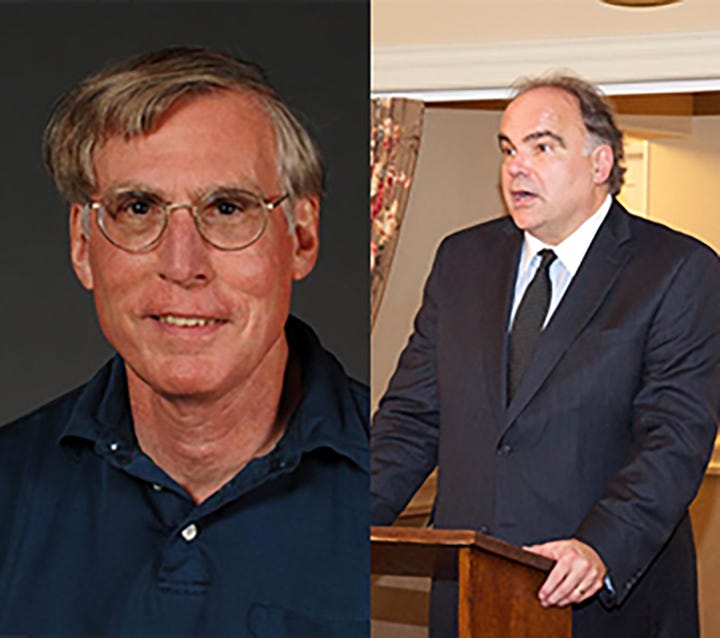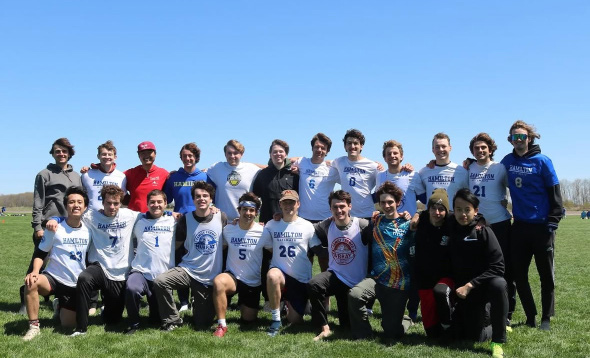
As 2018 begins, two history professors’ time at Hamilton College will soon come to a close. Professor Alfred Kelly has taught on the Hill for 37 years and will retire at the end of the spring semester. Professor Robert Paquette, who has taught at Hamilton for thirty years, plans to retire this December after taking leave for the 2017–2018 academic year.
In process of filling open positions, each affected department offers different curricular opportunities based on a new professor’s interests or the loss of a professor who no longer teaches certain classes.
“Retirements are also moments of renewal. When any faculty member retires, a department may wish to ask for a position in an area that is nothing like that of the retiring professor because they want to explore or offer courses in new areas,” Associate Dean of Faculty Onno Oerlemans said. “Or,” he added, “the College may wish to move a position from one department to another. This natural turn-over in faculty is one of the ways the College is able to make changes, and because we are in a period in which there are a relatively large number of retirements, there will be some significant changes to curriculum, and this is how it should be.”
Professor Kelly also described his excitement for the History Department’s new curriculum under the care of new professors, seeing the upcoming changes as important to the changing interests of students.
“A good rule of thumb when deciding a new curriculum is when in doubt, try to do something unfashionable. That’s a real historian statement,” Kelly explained. “Now what’s unfashionable now with professional historians, and has been for the past 40 years, is military history, and there’s a big interest in that amongst students. But the professionals don’t do much of that anymore, so I’d like to see the department pursue that. I’d also like to see the department get a historian of the Islamic world.”
As the chair of the faculty-elected Committee of Academic Policy (CAP), Professor Nathan Goodale works with other members to read through employment proposals from various academic departments and compare the competing interests at the college.
“When Professor X retires, if there’s enough advance notice, say a year in advance of planning, then that department is allowed to reallocate that position, but that submission is still in that pool, so all submissions must we weighted against each other,” Goodale said. Because Hamilton has a zero-growth policy, meaning there is a hiring cap on the number of employees, requests for faculty positions to be filled cannot be guaranteed.
Despite the needs of department curriculum, faculty recommendations, and students’ opinions, a retiring faculty member’s position cannot always be replaced in the same department. At the end of the process, the Committee of Academic Policy offers their suggestions to the Dean of Faculty regarding which positions need to be addressed. “We make a recommendation, but there are nowhere near enough positions available that are requested by the departments,” explained Goodale.
“This year we have 19 requests and only four positions available, so we work with what we got and try to put those positions where they’re most needed.”
Kelly collected many proud moments as a professional historian and a professor throughout his time on campus. “One [proud moment] is receiving a note from a former student saying how much your class meant to them years after taking it. When that happens it always brings a smile to your face,” said Kelly. “Also, an anthology of Western Civilization documents included my book,
The German Worker
. And I didn’t know this was going to happen. But I’m looking through and I see all these various documents and some of them are by famous people and there’s mine that just pops up by surprise! That was a great moment.”
Reflecting on his 37 years of teaching at Hamilton, Kelly says, “The quality that is needed to be a good teacher is, as my best lecturer remarked, don’t bore the students. And so what I try to do most of all is be engaging and provocative and the older you get the easier that is to be because you don’t care what the students think and that’s important.”
Paquette, who was appointed to the faculty in 1988, published extensively over the course of his academic career.
Sugar Is Made With Blood
, his 1988 book, won the Elsa Goveia Prize, given every three years by the Association of Caribbean Historians for the best book in Caribbean history.
In 2005, he received the Mary Young Award for distinguished achievement from University of Rochester, his alma mater. Additionally, he was been awarded grants from the American Historical Association, the National Endowment for the Humanities, and the Charles Koch Foundation, among others. in 2008, President George W. Bush nominated Paquette for a seat on the National Council of the Endowment for the Humanities. In 2014, Carly Fiorina, on behalf of the Lynde and Harry Bradley Foundation and the American Conservative Union Foundation, presented Paquette with the Jeane Jordan Kirkpatrick Prize for Academic Freedom.
Paquette, in 2007, founded the Alexander Hamilton Institute. He has been repeatedly quoted in articles which have appeared in publications such as
TIME
,
Inside Higher Ed
, and
Reason
, among others. Reason, in 2016, described him as “the only conservative professor at Hamilton.”
Campus Reform
similarly notes that “Paquette is the only undergraduate professor from the nation’s top 50 liberal arts schools to donate to a Republican candidate for president during this [2016] election cycle.”
On Nov. 16, Paquette wrote: “I will not stand idly by and allow professors who think conservatism is a pathology to browbeat right-of-center students into silence.”
“For students,” he wrote, “I have this advice: caveat emptor. The utopian illusion often masks the totalitarian impulse.”















